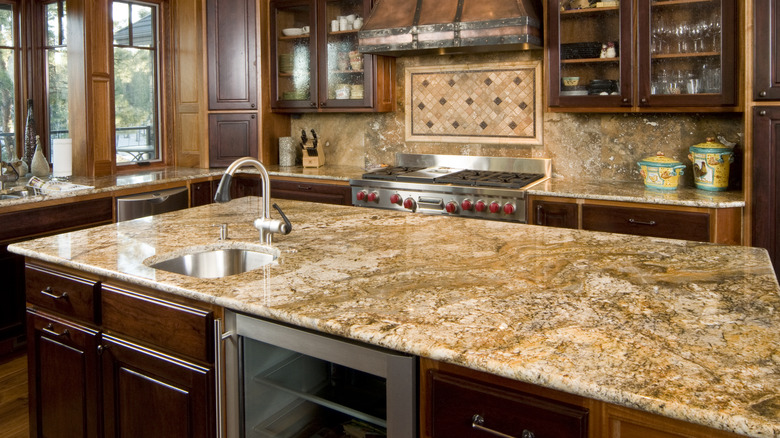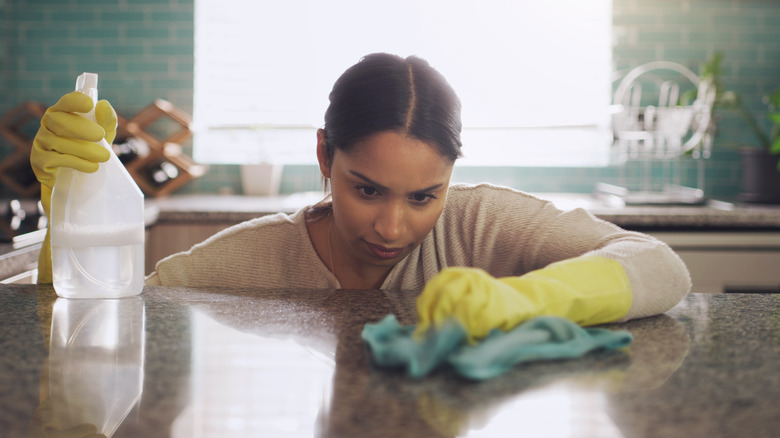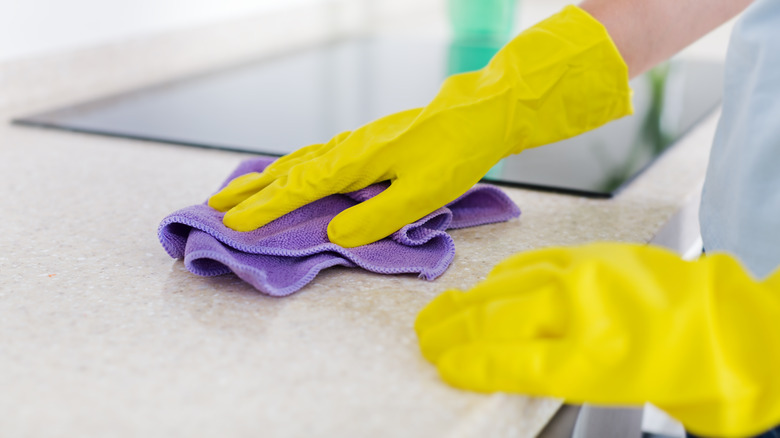Don't Panic If Your Granite Countertops Look Cloudy. Here's The Simple Solution
Granite is a stunning countertop option for kitchens. From the moment it's installed, it can add a high-end feel to the space while adding a natural element that makes your kitchen truly one of a kind. Yet, over time, you may notice the granite isn't shining as it should be or that it looks cloudy. This isn't uncommon, but it's also not a reason for concern. With a bit of proper maintenance, you may be able to remove that film from the surface of the granite and restore its overall beauty and sparkle.
Most often, granite is a very strong, durable surface. Your granite countertop is typically made solely of granite stone, typically in a slab sliced from a mountainous region. Granite offers numerous benefits, such as being resistant to scratching and chips, being heat and stain resistant, and offering a unique veining or color pattern throughout it.
However, it is a porous material as well, like most other natural stones. Most often, your manufacturer will seal the stone, limiting the amount of fluid and other substances that seep into it. However, those tiny pockets of space located throughout the structure of the granite can lend itself to absorbing some material. If you don't polish and shine it, that surface can hold onto that material for some time, creating a film over it. Before trying anything to get your granite into pristine condition, be sure you've checked the warranty and know the type of treatment it's already had.
What is causing your granite countertops to look cloudy
The film on your granite countertop's surface likely comes from what's been placed on it. For example, you may have tried to seal the surface of the countertop recently or hired a professional to do it for you. While sealants are beneficial, they must be buffed well and applied according to the manufacturer's directions. If they are not properly removed or too much of the substance remains on the surface, this will create a film that limits the stone's natural ability to shine.
Another potential cause is the cleaning methods you are using. Whenever possible, use just water to clean up the surface of the granite. You can also use a combination of water and isopropyl alcohol to disinfect it. A mild dish detergent can also help. However, once you clean the surface of the debris and disinfect it, dry it off. Make sure to rinse and remove all of the detergent or chemicals applied to it. Otherwise, the surface may look cloudy, even if it feels dry to the touch.
If you haven't cleaned the granite in some time, that could also be the culprit of the cloudy appearance of the granite. This can happen when grease from cooking creates a layer over the top of the countertop surface. Initially, it may seem shiny, but over time, that grease will thicken enough to create a film. Make sure you've cleaned the surface well to minimize this risk.
How to fix cloudy granite countertops
No matter why it happened, you now have cloudy granite countertops that lack their luster and gloss. It doesn't have to be a challenge to restore them since granite can be very forgiving. The first step should be to clean the surface. Use a quality dish soap, a clean sponge, and warm water to wash the surface down. You can purchase a granite cleaning agent to help you if the film has been there for some time.
Then, buff the countertops well. You can do this by hand with a clean, dry, soft cloth if you like. This will help remove any of the film that's caught in those fissures. It also helps to remove any residue from the cleaning agent you're using.
The final step in this process is sealing the countertop properly. Most granite countertops benefit from sealing (remember to check that warranty to verify what's been done to your stone). Most often, this needs to be done every five to seven years, depending on the type of initial sealant placed on it. If the granite needs to be sealed, use a product designed specifically for granite that's high quality. Once you've sealed it properly, polish it. This will help to protect the stone and remove any excess sealant that could otherwise cloud the surface again.


